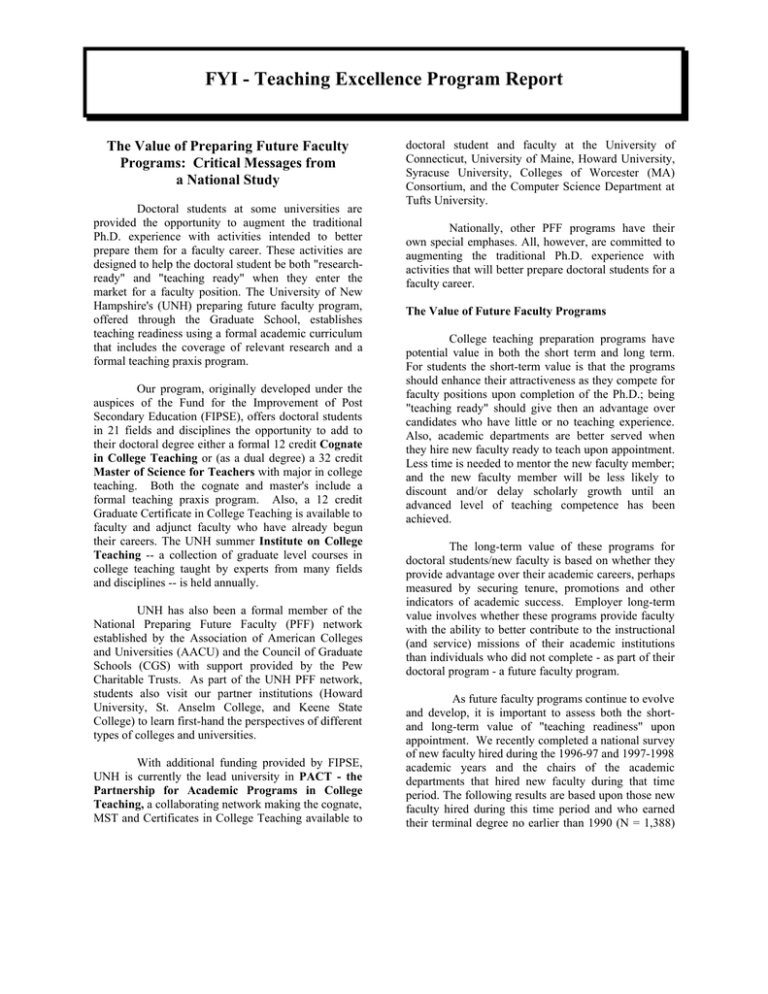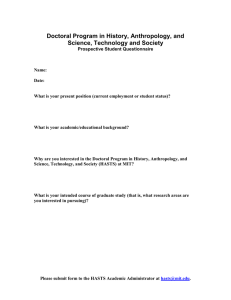FYI - Teaching Excellence Program Report
advertisement

FYI - Teaching Excellence Program Report The Value of Preparing Future Faculty Programs: Critical Messages from a National Study Doctoral students at some universities are provided the opportunity to augment the traditional Ph.D. experience with activities intended to better prepare them for a faculty career. These activities are designed to help the doctoral student be both "researchready" and "teaching ready" when they enter the market for a faculty position. The University of New Hampshire's (UNH) preparing future faculty program, offered through the Graduate School, establishes teaching readiness using a formal academic curriculum that includes the coverage of relevant research and a formal teaching praxis program. Our program, originally developed under the auspices of the Fund for the Improvement of Post Secondary Education (FIPSE), offers doctoral students in 21 fields and disciplines the opportunity to add to their doctoral degree either a formal 12 credit Cognate in College Teaching or (as a dual degree) a 32 credit Master of Science for Teachers with major in college teaching. Both the cognate and master's include a formal teaching praxis program. Also, a 12 credit Graduate Certificate in College Teaching is available to faculty and adjunct faculty who have already begun their careers. The UNH summer Institute on College Teaching -- a collection of graduate level courses in college teaching taught by experts from many fields and disciplines -- is held annually. UNH has also been a formal member of the National Preparing Future Faculty (PFF) network established by the Association of American Colleges and Universities (AACU) and the Council of Graduate Schools (CGS) with support provided by the Pew Charitable Trusts. As part of the UNH PFF network, students also visit our partner institutions (Howard University, St. Anselm College, and Keene State College) to learn first-hand the perspectives of different types of colleges and universities. With additional funding provided by FIPSE, UNH is currently the lead university in PACT - the Partnership for Academic Programs in College Teaching, a collaborating network making the cognate, MST and Certificates in College Teaching available to doctoral student and faculty at the University of Connecticut, University of Maine, Howard University, Syracuse University, Colleges of Worcester (MA) Consortium, and the Computer Science Department at Tufts University. Nationally, other PFF programs have their own special emphases. All, however, are committed to augmenting the traditional Ph.D. experience with activities that will better prepare doctoral students for a faculty career. The Value of Future Faculty Programs College teaching preparation programs have potential value in both the short term and long term. For students the short-term value is that the programs should enhance their attractiveness as they compete for faculty positions upon completion of the Ph.D.; being "teaching ready" should give then an advantage over candidates who have little or no teaching experience. Also, academic departments are better served when they hire new faculty ready to teach upon appointment. Less time is needed to mentor the new faculty member; and the new faculty member will be less likely to discount and/or delay scholarly growth until an advanced level of teaching competence has been achieved. The long-term value of these programs for doctoral students/new faculty is based on whether they provide advantage over their academic careers, perhaps measured by securing tenure, promotions and other indicators of academic success. Employer long-term value involves whether these programs provide faculty with the ability to better contribute to the instructional (and service) missions of their academic institutions than individuals who did not complete - as part of their doctoral program - a future faculty program. As future faculty programs continue to evolve and develop, it is important to assess both the shortand long-term value of "teaching readiness" upon appointment. We recently completed a national survey of new faculty hired during the 1996-97 and 1997-1998 academic years and the chairs of the academic departments that hired new faculty during that time period. The following results are based upon those new faculty hired during this time period and who earned their terminal degree no earlier than 1990 (N = 1,388) FYI - Teaching Excellence Program Report and chairs of department that also hired new faculty in this time period (N = 697). Respondents include a broad range of fields and disciplines and worked at a broad range of hiring institutions. Critical Findings and Messages from our National Study 1. Results indicated that hiring departments placed high value on a candidate's teaching readiness as indicated by the candidate's overall teaching credentials and experience. "College-level teaching credentials" are more extensive than just performing the duties of a teaching assistant -- they involve teaching one or more college level courses in the candidate's specific field or discipline. 2. More than half (59.4%) of new faculty indicated that they had taught courses in their field/discipline while a doctoral student, and indicated that they thought that this experience helped them obtain their current faculty position. More than threequarters of the newly hired faculty (77.6%) also reported having been a Teaching Assistant (TA). This group ascribed less hiring value to this experience. 3. Newly hired faculty thought it was important to provide more information than requested concerning their teaching. Results from the chairs' survey confirmed that chairs also found this additional information important. Teaching preparation programs need to provide students with assistance in developing and presenting a Statement of Teaching Philosophy, Statement of Teaching Interest, an appropriate presentation of student evaluations of their teaching, and, in some cases, with a formal teaching portfolio. 4. Chairs of hiring departments want graduate programs to enhance their emphasis on college teaching and reported that the candidates they hired would have benefited from "additional" training in college teaching. 5. Newly hired faculty recommended that graduate programs enhance their emphasis on preparing faculty for teaching. 6. Newly hired faculty reported that their research credentials were most important in their department's decision to hire them. However, they also ascribed a high importance to their teaching credentials. This finding supports the dual importance of teaching and research credentials in hiring. It further suggests that doctoral programs may need to assign higher priority to a doctoral student's teaching credentials. Many newly hired faculty entered academic departments that placed more importance on teaching than research. As such, these hiring departments may be very different than the research-focused departments and programs from which these new faculty received their training. Preparing Future Faculty (PFF) programs that formally introduce doctoral students to typical hiring departments provide a valuable service in preparing new faculty for the different cultures they will experience as new faculty. Related to this is the developing recognition that doctoral students want and need additional formal preparation in teaching. New professors who lack appropriate preparation and experience learn to teach under fire, thereby jeopardizing their students' learning and disadvantaging themselves as they strive for tenure and promotion. We can only speculate that as this want and need continues, more doctoral programs and graduate schools will see the value associated with formal academic programs in College Teaching designed to augment the Ph.D. experience. Without some form of augmentation and enrichment beyond research, the traditional Ph.D. while necessary, appears insufficient preparation for the many roles -- especially teaching -- performed by the college and university professor. Summer 2001 The study was conducted by Victor A. Benassi (Professor of Psychology and Associate Vice President for Academic Affairs), Edward J. O'Brien (Professor of Psychology), and Lee F. Seidel (Director of the Teaching Excellence Program and Professor of Health Management and Policy) at the University of New Hampshire and was facilitated by the Association of American Colleges and Universities (AACU) and the Fund for the Improvement of Post Secondary Education (FIPSE) of the U.S. Department of Education. Questions and comments related to this paper and the study should be directed to Teaching Excellence Program, University of New Hampshire, 11 Brook Way, Durham, NH 03824 or (603) 862-0233 or email teaching.excellence@unh.edu


